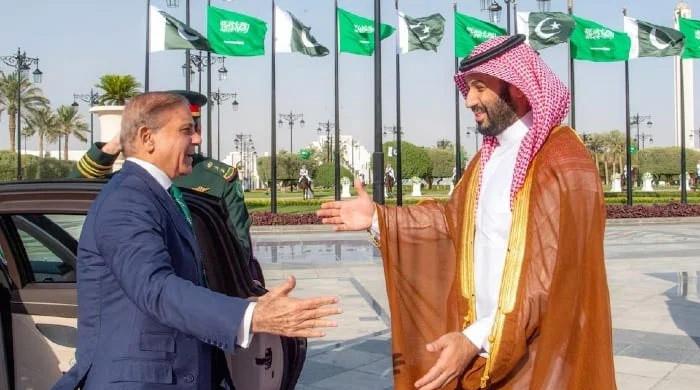Pakistan and Saudi Arabia Forge Mutual Security Pact
Despite decades of close collaboration, the recent announcement of a mutual security agreement between Pakistan and Saudi Arabia may appear to simply formalize their long-standing alliance. However, this agreement signifies something of greater consequence.
According to reports, this accord represents the initial concrete indication of a potential post-American global landscape, defined by heightened insecurity, instability, and unpredictability.
The two nations maintained a close relationship for many years. In 1967, following Israel’s triumph in the Six-Day War, they established a security pact where Pakistan’s seasoned military pledged to provide training and assistance to the Kingdom. Subsequently, Pakistani pilots served Saudi Arabia during its conflict against communist South Yemen.
By the 1980s, the military leadership in Rawalpindi deployed 15,000 troops to aid in safeguarding a regime unsettled by the Mecca siege in 1979. Pakistani tanks were even stationed at Tabuk, near the Kingdom’s northwestern border, not far from Israel’s Red Sea port of Eilat. Yet, such closeness seemed to belong to the past after Pakistan’s National Assembly surprisingly defied Riyadh in 2015 by declining to dispatch soldiers to combat the Houthis.
The Saudis expressed outrage, especially given their history of financially supporting Pakistan. They had provided a $1.5 billion “gift” the previous year. Nevertheless, Chinese investment had also begun to increase, diminishing the dominance of the petrodollar. Civilian politicians in Islamabad believed they could afford some risk and regain some sovereignty.
Over the subsequent decade, Saudi Arabia cultivated a stronger relationship with India. Its grants to Pakistan transformed into loans requiring repayment or renewal. Meanwhile, China is now focused on securing Russia’s allegiance.
Pakistani leaders recognize their inability to address the core issue causing the nation’s recurring financial instability: importing more goods than it exports. Decades of investment primarily in the military have left them with little else to offer a partner.
However, this offer is appealing to a Riyadh facing similar uncertainties as in the 1970s. For decades, the Gulf monarchies depended on the U.S. for defense, support, and weaponry, even going to great lengths to court the current president. For example, Qatar famously gifted him a $400 million jet for use as Air Force One.
Nevertheless, this did not prevent the emirate, home to the largest U.S. base in the Middle East and a hotel accommodating Hamas leaders, from being bombed by Israeli jets earlier this month month. Qatari authorities asserted that any American warnings regarding the attack were received 10 minutes after the strikes had already commenced.
This marked the second instance of an attack on Qatar this year; in June, Iran launched missiles at the U.S.’s Al Udeid airbase. In essence, Qatar was bombed by both America’s adversary and its ally, with Washington taking no action in either situation.
Nations are now considering that an indifferent U.S. may present more complications than benefits, prompting them to seek assistance elsewhere. This has led the Saudis back to Pakistan, which offers concerned former American allies something unique: a nuclear umbrella.
Riyadh’s other partners are not pleased. New Delhi has particularly celebrated Pakistan’s perceived isolation from its Gulf allies in recent years. Policymakers would have been informed beforehand of the Saudi’s decision and comprehend the reasoning behind it.
However, it is still a setback, particularly as India’s own choices have contributed to this situation. Its relationship with Israel has grown as close as, or perhaps even closer than, its ties with Saudi Arabia, reducing its value to both. The limitations of this hedging strategy have become evident. Attempting to strengthen relations with Iran, Israel, and Saudi Arabia concurrently has left none of them feeling they can rely on New Delhi during the current crisis. Being a friend to all has resulted in being a friend to none.
This once applied to Pakistan, which has attempted to accommodate the Taliban, China, the U.S., and the Gulf states. However, it now faces discord with Kabul, and the U.S. has shifted its focus away from the region. Ironically, this has simplified Islamabad’s strategic decisions.
Nobody is entirely content. The Saudis share the frustration of all Pakistan’s patrons with a government that consistently over-promises and under-delivers. The Israelis acknowledge that their “normalization” with Saudi Arabia will face further delays. The Pakistanis have had to relinquish the autonomy they gained in 2015; the Indians are concerned that Islamabad is no longer isolated; and the Iranians feel encircled. And when reason prevails in Washington, policymakers will regret enabling a new alliance between the Middle East’s wealthiest nation and Beijing’s most dependable client.
This is a glimpse of the post-American world. Without the U.S., nations will forge whatever provisional security arrangements they can. Some may be objectionable, even destabilizing. Ultimately, nobody will benefit, including Washington.



Comments (0)
No comments yet. Be the first to comment!
Leave a Comment